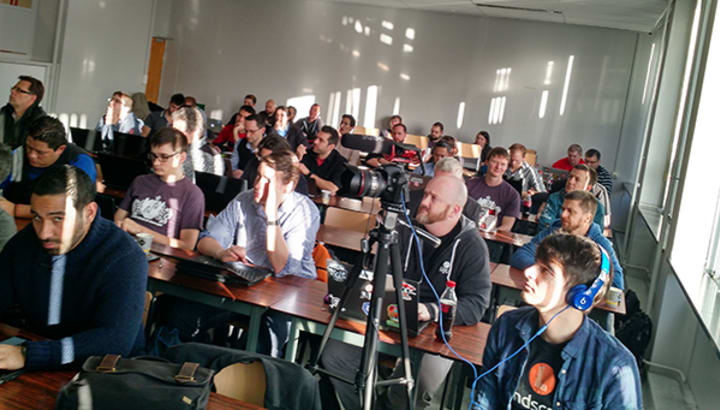Juju Charmers Summit: Day 2
Guest
on 5 February 2016

I’ll be honest with you here, I love open source software evangelism, I will talk about it for days given an audience. You are my audience, so thank you very much….
Okay, so I won’t lie last night involved some consumption of alcohol. Luckily everyone rocked up pretty much on time, and then it rained really hard, so anyone who drank too much and missed the bus got quite wet. Anyway, on to the conference, the morning was filled with some interesting talks, having worked on systems continuous testing with Jenkins many years ago I hung out in the testing track room. It was a nice bit of validation that I wasn’t completely mad 6 years ago when I was trying to test all our stuff, even though it wasn’t cloud based back then.
In the afternoon I hung out in the Juju room. Today was curtailed, in that there were only 3 talks, but they packed a lot of useful information. The final talk of the day was about Juju’s big data charms. If you’ve not used them, I highly suggest you do. Instead of messing around with virtual box machines and scaling a demo, you can run a whole multi node Hadoop cluster in one line of code. This is great for explaining Hadoop ecosystems to clients, because when they ask “what does it take to get this into production?”, the answer is of course, “it is in production”, this isn’t some laptop based container demo(although it can be), this is “live” in the cloud.
If you are already users of alternative systems orchestrations platforms there was a good talk today about using some of that code in your charms for deployment across your cluster. This may not be the best way to maintain charms in the long term, but certainly, if your company already uses an orchestration platform but you want to enhance that with Juju, there is no reason to not combine the two.
Sandwiched in between the two was a talk on Kubernetes, I’m not overly knowledgeable on the subject, so at that point I tuned out and got down to properly investigating layers. Layers are Juju style inheritance and I had fun on my first iteration of a Pentaho Data Integration charm. The cool thing about this charm is that you will be able to scale instantly using the PDI clustering configuration to be able to instantly build a multi-node ETL cluster.
If you are bored and looking for something to do, building a charm isn’t a bad thing. Being able to leverage the power of your chosen tool on a flexible computing platform with minimal configuration is a great thing. Juju is open source and actively developed and used by Canonical. Get involved, talk to the folks, they are very nice. If you mail the mailing list you’ll get a reply, half the time by Mark Shuttleworth, which does make me wonder when he does real work, but then I noticed he had a little nap in Mondays sessions, so I guess he gets it when he can….
Most of the non hardcore guys are off home after 2 days of learning. Us hardcore people are back for day 3, which is Juju only, I can’t wait.
About the author

Tom is the founder and technical director of Meteorite.bi, a consulting company specialising in the Saiku Analytics platform. His weekly duties include BI consulting, Scala & Java programming and tinkering with System Administration frameworks. In his spare time Tom is a regular blogger and open source committer. You can read more about Tom on the Meteorite.bi blog.
Talk to us today
Interested in running Ubuntu in your organisation?
Newsletter signup
Related posts
Deploy your Spring Boot application to production
In this article we walk through the steps required to deploy a Spring Boot application to production using Juju and Kubernetes. The goal is to showcase the...
Effortless observability for Django applications
Observability is critical for web operations to ensure that the application is working as expected and to identify any potential issues. However, setting up...
Kubernetes backups just got easier with the CloudCasa charm from Catalogic
For a native integration for Canonical’s Kubernetes platform, Juju was the perfect fit, and the charm makes consuming CloudCasa seamless for users.
